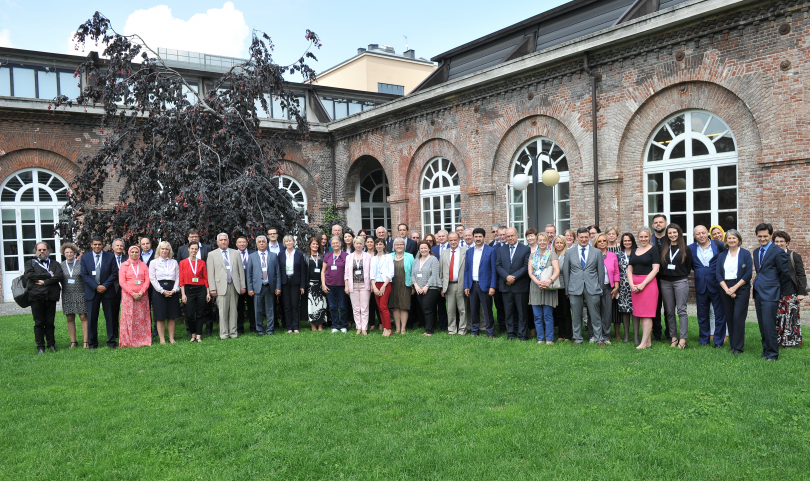
Turning it up to level 5!
Robotics, environmental technology, public health management – the diversity of interesting jobs and career advancement opportunities with a Level 5 qualification is extensive. At the crossroads of university and vocational education, Level 5 demonstrates specialised and practical skills, creative problem-solving and management. The gateway to innovation, this qualification is an attractive option for learners and employers alike!
In many countries, Level 5 can also be validated through learning that takes place outside of the classroom, on-the-job, even online. But not all qualification systems are created equal. The best ones bring education and training providers, together with business and other social partners to deliver the skills for today and tomorrow.
To help explore best-practice, challenges, opportunities and policy actions the European Training Foundation (ETF) together with the Council of Europe, both working on qualifications reform in the EU neighbourhood, hosted the ‘Shaping Level 5’ conference in Turin, 7-8 June.
More than 60 policymakers, employers, educators, experts, EU officials and social partners from across Europe (from Belgium, the Netherlands, France, Germany, Finland) and 14 of the ETF’s partner countries (from North Africa, the Middle-East, Turkey, the Balkans, Eastern Europe and Central Asia) took part.
Opening the conference, the ETF’s Xavier Matheu de Cortada said National Qualification Frameworks, where qualification levels are defined (typically 1-4 in vocational education and 6-8 in higher education) are the perfect tool to provide quality assured, recognisable skills for the labour market. ‘They can equip citizens for lifelong learning, recognition and mobility within and across countries.’
Jean-Phillipe Restoueix, from the Council of Europe’s Higher Education Unit, says a common obstacle for Level 5 however, is the ‘complicated’ relationship between higher and vocational education. ‘Building trust is key. You need to make the bridge more obvious.’
The sweet spot
Like dessert and cheese, vocational education and higher education go together, says Jean-Louis Gouju, an advisor with France’s Higher Education Ministry. ‘Just ask any Frenchman!’ Sharing the EU best-practice approach, Mr Gouju highlighted the country’s integrated approach that harmonises Level 5 diplomas from vocational and higher education with labour market needs, a process that is enhanced through the multi-stakeholder dialogue.
French employers are particularly happy with the ‘employability’ of Level 5, he says. ‘We continue to try to reduce the gap between higher education and vocational competences, because the cross-cutting competences are absolutely necessary for employers: languages, IT, teamwork, etc.
‘But we cannot keep using academic language on one hand, and VET on the other. We need to build round tables, places in which we can learn to work together in order to share challenges. And this doesn’t happen overnight.’
Business on board
Mirjana Kovacevic, head of educational division in the Serbian Chamber of Commerce and Industry, agrees that employers praise the Level 5. ‘It offers a combination and harmonisation of practical and theoretical knowledge that is certified.’ ‘The voice of business is very important, for all countries,’ she adds. ‘We want to help shape education to meet the needs of the business sector.’
Ukraine’s First Deputy Minister of Education and Science Volodymyr Kovtunets said employers want more vocational education Level 5s. The ratio between the qualification offered through higher education and vocational education is 1:5, he said, speaking in the context of Ukraine’s recent educational reform. ‘Many young people use the vocational Level 5 as a bypass to higher education, he said. We are not securing the number of professionals with vocational qualifications and we need to change the situation.’
The two-day workshop provided a forum for participants from all countries to share their experience, challenges and opportunities to leverage better policy and practice outcomes.
ETF partner countries: Albania, Azerbaijan, Belarus, Bosnia and Herzegovina, Georgia, Israel, Kazakhstan, Kosovo*, Moldova, Morocco, Serbia, the former Yugoslav Republic of Macedonia, Tunisia, Turkey, Ukraine.
* This designation is without prejudice to positions on status, and is in line with UNSCR 1244/1999 and the ICJ Opinion on the Kosovo declaration of independence.
Did you like this article? If you would like to be notified when new content like this is published, subscribe to receive our email alerts.